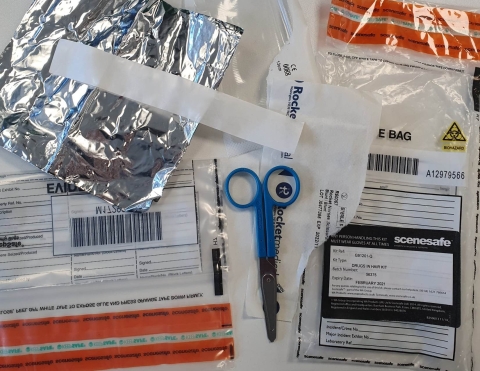

An investigation into a “criminal waste” of plastic at police crime scenes has just begun at the University of Portsmouth.
15 February 2023
3 minutes
An investigation into a “criminal waste” of plastic at police crime scenes has just begun at the University of Portsmouth.
A veteran crime scene investigator, now studying for a PHD, will spend the next three years examining why an increasing amount of single-use plastic is being used at crime scenes, and how forensic investigations could be made more sustainable.
Becci Henderson has been a Crime Scene Investigator (CSI) for 22 years. She’s noticed an “enormous” growth in the amount of plastics used, despite a dramatic reduction in the amount of jobs CSIs are able to attend due to an increase in administration. In the last two months she went to 62 crime scenes and collected 255 exhibits. Each exhibit generated an average of 55g of plastic waste.
From an environmental point of view the current situation is criminal.
Becci Henderson , Crime Scene Investigator
Becci explains: “At just one job I generated more than two kilograms of waste, which all went in the bin and a lot of it was unused. We often can’t recycle or reuse the plastic so we need to look at reducing it at source. There is a need for a clinical way of working – but there are alternatives and there are ways of cutting down waste. There are improvements that can be made without impacting the quality and integrity of investigations. From an environmental point of view the current situation is criminal.”
Plastic is used to protect scenes of crime officers (SOCO) and stop cross contamination of the area being investigated. SOCOs are required to wear two pairs of plastic gloves and a mask at most crime scenes as a bare minimum, with the addition of over suits, hair nets and boots at major crime scenes. Plastic drop sheets are deployed at all scenes and virtually everything used to collect evidence incorporates plastic.
Once Becci has studied attitudes to the use of plastic at crime scenes amongst CSIs, and whether there are differences between forces across the UK, she will then begin work on how the situation could be improved. This is likely to include the possible introduction of compostable alternatives, redesign and the introduction of reusable equipment.
Becci’s investigation is likely to have a positive impact on policing as well as the environment.
Dr Paul Smith, Interim Head of School, Institute of Criminal Justice Studies
More than two decades of crime scene experience has taught Becci that changes could be made. She says: “There are a number of things we can look at to improve. The design of packaging, expiry dates, behaviours and product design. For example, swabs are too long. They were originally manufactured for medical use and could be redesigned for forensic work.”
Dr Paul Smith, Interim Head of School, Institute of Criminal Justice Studies says: “This is innovative research that is looking at an important area of police activity to see if it can be done in a more sustainable way. Becci’s investigation is likely to have a positive impact on policing as well as the environment.”
In November 2021,the University of Portsmouth’s Revolution Plastics initiative launched the Global Plastics Policy Centre — designed to give governments and industry groups the evidence needed to make better decisions on plastic policies. The Centre is the first of its kind and will provide a central point for information, effectiveness and barriers to plastics policy success.
